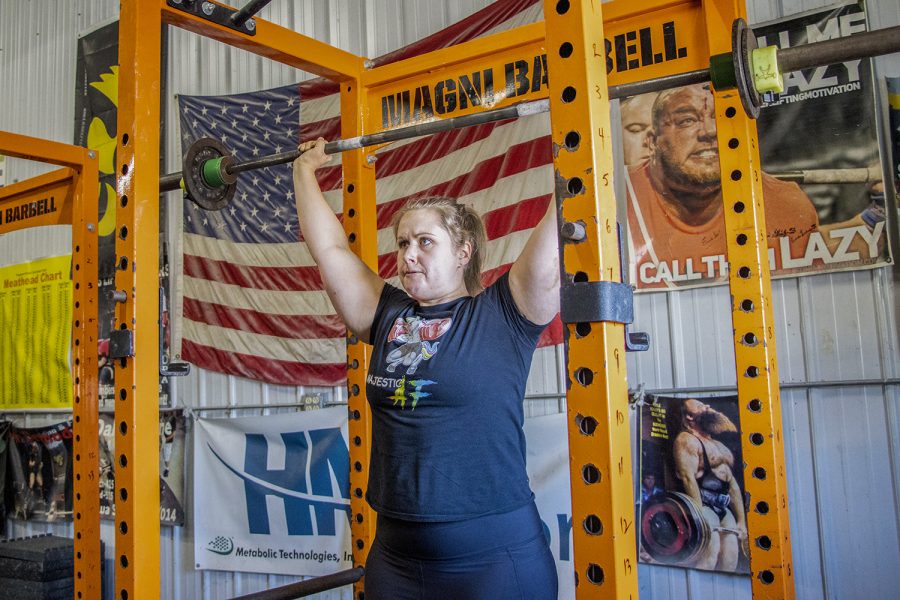UI study finds older people who weightlift live longer lives
A recent study from University of Iowa professor Jessica Gorzelitz finds older adults active in weightlifting live longer lives than inactive adults.
Jessica Gorzelitz overhead presses weights at Magni Gym in Coralville, Iowa, on Saturday, Oct. 15, 2022.
October 18, 2022
Researchers, including a University of Iowa professor, followed subjects for nearly a decade and found weightlifting may prevent early mortality in older adults.
Jessica Gorzelitz is an assistant professor of health promotion in the UI’s Department of Health and Human Physiology who joined the study to assist her colleagues in analysis writing and the peer review process. The study started in 1996 and published on Sept. 27.
“We had about 100,000 individuals who told us about their weightlifting behaviors, and then we followed them for about a decade,” she said. “We were able to compare those who told us they weightlifted to those who did not.”
Gorzelitz initially began her research a decade before the study started.
“It’s what we call a cohort study, and these types of studies are very time intensive,” she said. “They require a lot time and a lot of resources.”
According to the 2022 study, older adults who lifted weights experienced a 9-22 percent lower mortality risk. The biggest difference in the study found a 47 percent decrease in the risk of death in adults who exercised compared to adults who did not.
Participants in the study ranged from 66 to 76 years old, and 28,477 out of the 99,713 participants died over the 9.6-year time frame.
According to the U.S. Bureau of Labor Statistics, 8.9 percent of people aged 15 and older participated in weightlifting between 2011-15.
Gorzelitz said her interest in weightlifting started during her time at the National Cancer Institute. She noticed a lack of information related to cancer survivors and their exposure to weightlifting.
“I wanted to better understand how exercise in the post-diagnosis period can help individuals live longer lives and help reduce their symptom burden,” she said.
After working with cancer survivors, the study moved toward mortality risk, then expanded to include the mortality risk of older adults as a population, she said. Gorzelitz’s research supports activity of any level for older adults.
“More [weightlifting] is better than some, but some is better than none at all,” she said.
Gorzelitz’s study was in the British Journal of Sports Medicine.
Now, Gorzelitz said she plans to bring her studies to the UI.
RELATED: UI assistant professor of biomedical engineering receives grant to combat lung disease
“Our next study is using the same data, and now we’re going to isolate the effect and just study cancer survivors,” she said. “Since we did this in older adults, I want to pull out and separate individuals who might have had a [cancer] diagnosis to measure the effects of both aerobic exercise and weightlifting here on campus.”
Gorzelitz’s lab at the UI also helps individuals with cancer engage in physical activity.
“We can use the observational data and studies like this to understand patterns to see what outcomes are associated with exercise and use the results as a key piece of health promotion,” she said.
Ethan Miera, UI Campus Recreation and Wellness Center personal trainer, wrote in an email to The Daily Iowan he has seen many benefits of weightlifting in his personal life and with his clients.
“I have an older client, and I will always encourage them to get into weightlifting,” Miera wrote. “Lifting weights is capable of not only improving musculature, but bone health as well. It will make it easier to do more common activities such as getting out of a chair or lifting something overhead.”
Another trainer, Devin Behrendsen, wrote in an email to the DI that weightlifting is about finding the best way to promote a healthy lifestyle.
“Weight training [is] even more important as we age,” he wrote. “Having a stronger body can help to avoid accidents such as falls. Monitoring intensity and prioritizing recovery becomes exponentially more important as we age.”
Luke McGrane, a second-year student at the UI, has lifted weights since he was 14 years old.
“My experience has been really good so far,” he said. “[Weightlifting] makes me feel more energetic, focused, and just improves my mood in my day-to-day life.”
McGrane said he doesn’t know any older people who weightlift but encourages those curious to take the challenge.
“Even simple resistance training is for flexibility and mobility in all ages, not just like for young people,” he said. “It’s really fun, and it’s an enjoyable way to see yourself progress.”



